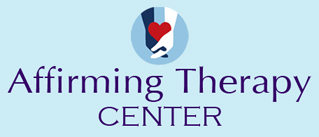Couples Counseling
Are you looking for more passion and intimacy in your relationship? Are your conflicts getting in the way of the closeness you desire from each other?
Our team at Affirming Therapy Center offers an array of relationship counseling services and affirming relationship therapy that includes the following situations, issues, and experiences:
• Premarital Counseling
• Marital Counseling
• Increasing Intimacy / Sexual Satisfaction
• Healing from Infidelity
• Sex Therapy with Couple’s Therapy
• Polyamorous Families
• Open Relationships
• Opening Up Process
• BDSM/Kink Relationships
• Discernment Counseling
• Coordination of Care
Whether you are single, in a primary relationship, triad, quad, V, D/s, non-hierarchical, or any other love constellation, we provide a safe space to discuss delicate topics and strive to make you feel comfortable and understood.

Your First Step:
Congratulations! The fact that you found this page shows that you are interested in taking the first step towards making your relationship better. It’s wonderful that you want to work on improving your relationship with your partner(s).
Our primary goal is to help people be happier in their lives and relationships.
Affirming Relationship Therapy and Relationship Counseling
We specialize in Emotionally Focused Therapy (EFT), which is shown to be one of the most effective therapies for couples. This type of therapy is geared toward the importance of attachment bonds, recognizing the cycles where you may feel stuck, and learning how to change the way you and your partner relate to each other in a meaningful way.
We help couples to:
• move past cycles of conflict
• get through difficult moments together as a team
• express emotional needs
• better understand each other’s perspectives
By creating a secure foundation for your relationship, opportunities for more closeness and relationship satisfaction begin to grow.
Sexual Satisfaction
Physical intimacy is an important aspect of relationships, yet sex can be a very sensitive topic for many people. With backgrounds in Sexology, each clinician at Affirming Therapy Center is comfortable and willing to discuss topics about sexuality in a non-judgmental and frank manner. These topics may include issues or concerns with sexual health, healing from infidelity, increasing intimacy, re-igniting passion, sexual compatibility, and improving mutual sexual satisfaction. A lack of clear communication of needs and desires often leads to feelings of neglect, rejection, or resentment. Being able to talk to your partner about your needs and desires is a crucial skill to develop in relationship counseling.
Better than “Good Enough”
We want you to envision having the best relationship you can and not just settling for “good enough” or “at least we don’t fight anymore!” While it’s great to stop fighting, you deserve to explore and enjoy more dimensions and possibilities for a healthy and secure relationship.
Next Steps:
Contact us now to schedule an initial session or a free 10-15 minute phone consultation with our Relationship specialists.
Affirming Relationship Therapy and Relationship Counseling – FAQ
Q. What are the goals of affirming relationship therapy and relationship counseling?
A. Each relationship is unique, so naturally the goals of therapy will be different for every couple. For some, the goals are to learn tools to diffuse conflict, to rekindle passion and/or to reclaim a new level of commitment to the relationship. For others, it may be that the goal is how to separate cordially and with as little pain and suffering for themselves and their partner as possible.
Q. What if my partner is reluctant to come in?
A. It is very common for one partner to be reluctant to start relationship counseling. The good news is that this does not predict whether treatment will work. Often the partner who is most reluctant to come in actually becomes the most motivated to change, once they discover some tools to make the relationship work better.
Q. But, what if only one partner will attend therapy?
A. Sometimes one person is either reluctant to attend therapy or unable to for logistical reasons. Luckily, the quality of a relationship can still be improved, even if only one partner attends therapy. Relationships are often stuck in cycles, so any change to the cycle can help the couple to get unstuck. In fact, some therapists prefer working with one partner at a time in order to better identify individual concerns. It’s okay to take these first steps by yourself; you will be in a safe place.
Q. Relationship Counseling has a reputation that it is the final stop before divorce. Will it work for me?
A. Will it work for you? We don’t know. Because therapy involves emotional connections between different people with so many factors in play, it is not possible to guarantee outcomes.
However, we do know that you won’t know if it will work for you unless you try. Sometimes it is better to take a risk than stay stuck in a place that doesn’t work.
Q. What if our disagreements don’t seem to be resolvable?
A. Some disagreements may not be resolvable. Sometimes it is necessary to agree to disagree on certain issues. But often disagreements are more resolvable than both partners think they will be. Because partners get into a negative feedback loop with each other, they can quickly develop a sense of despair that real change is possible. One negative outcome triggers the next, in a kind of endless loop. But once the cycle is interrupted, both partners often quickly develop hope that things can improve and they become motivated to make the changes necessary.
Q. This sounds like a a lot of work. I’m not sure I have the energy to do it.
A. It does take work. Intimacy takes work. It is one of the great myths of our culture that relationships should be easy. You also have to take into account that you may currently be feeling worn down by a sense of hopelessness about your relationship. Depression is contagious. However, once you make a commitment to the process and you take the first steps, energy will be freed up for you to continue. The first steps of change can be highly motivating, and they can release a lot of energy. You develop a positive feedback loop, instead of a negative feedback loop.
Q. Can we survive the affair as a couple?
A. Yes, probably. But, working it through often requires help.
Q. We haven’t had sex for years. Is there a chance we will again?
A. Yes, there is a chance. Often times, sexual abstinence is a sign of an emotional deficit in the relationship. Working on rekindling your emotional connection will increase the likelihood for physical re-connection.
Q. What theories influence your work with couples?
A. The clinicians at Affirming Therapy Center have been trained in and use the framework of Emotionally Focused Therapy (EFT). This theory focuses on working to make significant and lasting changes at the primary level of connection and attachment. EFT is geared toward the importance of your attachment bond with each other, recognizing the negative cycles that lead you to feeling stuck, and learning how to change the way you relate to each other at a deeper, more meaningful way.
We are also influenced by the Gottman approach (by John and Julie Gottman), the work of Harville Hendrix with Imago Relationship Therapy, and Esther Perel, the author of Mating in Captivity and State of Affairs.
Q. Are there any books we can use to get us started in the process?
A. Yes. We have two recommendations for you to become familiar with the concepts in Emotionally Focused Therapy. The first is Hold Me Tight: Seven Conversations for a Lifetime of Love by Dr. Sue Johnson. The second is An Emotionally Focused Workbook for Couples by Veronica Kallos-Lilly and Jennifer Fitzgerald. The second book is a practical resource, can be a helpful addition to the relationship counseling sessions, and can be used concurrently with counseling.
Our Affirming Relationship Therapists
You deserve a happy and fulfilling relationship. Contact one of our Affirming Relationship Therapy specialists now to continue on your adventure!
Services
Specializations
Kink, BDSM, and Fetish Exploration
LGBTQ-Friendly Therapy
Non-monogamy, Polyamory, & Open Relationships
Perimenopause, Menopause, and Postmenopause
Pet Play
Psychedelic-Assisted Psychotherapy
Relationship Challenges & Relationship Concerns
Sex Positive Therapist
Sex Therapy & Sexual Functioning Support
Sexual Health





